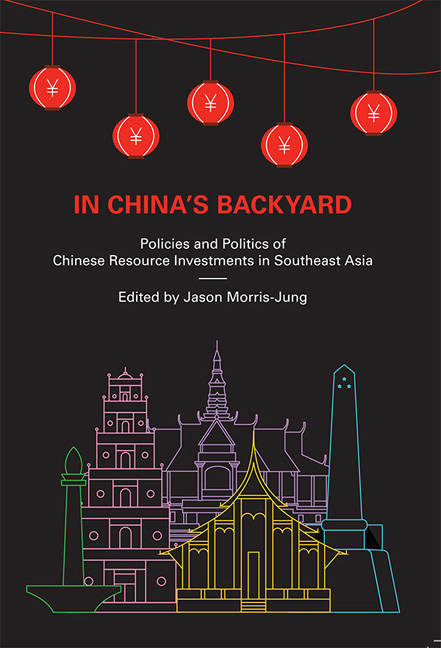Book contents
- Frontmatter
- Contents
- Foreword
- Acknowledgements
- About the Contributors
- 1 Introduction
- 2 Mixed Motivations, Mixed Blessings: Strategies and Motivations for Chinese Energy and Mineral Investments in Southeast Asia
- 3 Mineral Resources in China's “Periphery” Diplomacy
- 4 Energy Entanglement: New Directions for the China–Indonesia Coal Relationship
- 5 Indonesia–China Energy and Mineral Ties: The Rise and Fall of Resource Nationalism?
- 6 The Direction, Patterns, and Practices of Chinese Investments in Philippine Mining
- 7 Development Cooperation with Chinese Characteristics: Opium Replacement and Chinese Rubber Investments in Northern Laos
- 8 The High Cost of Effective Sovereignty: Chinese Resource Access in Cambodia
- 9 Complex Contestation of Chinese Energy and Resource Investments in Myanmar
- 10 Anti-Chinese Protest in Vietnam: Complex Conjunctures of Resource Governance, Geopolitics and State–Society Deadlock
- 11 Complexities of Chinese Involvement in Mining in the Philippines
- 12 Conclusion
- Bibliography
- Index
12 - Conclusion
Published online by Cambridge University Press: 04 July 2018
- Frontmatter
- Contents
- Foreword
- Acknowledgements
- About the Contributors
- 1 Introduction
- 2 Mixed Motivations, Mixed Blessings: Strategies and Motivations for Chinese Energy and Mineral Investments in Southeast Asia
- 3 Mineral Resources in China's “Periphery” Diplomacy
- 4 Energy Entanglement: New Directions for the China–Indonesia Coal Relationship
- 5 Indonesia–China Energy and Mineral Ties: The Rise and Fall of Resource Nationalism?
- 6 The Direction, Patterns, and Practices of Chinese Investments in Philippine Mining
- 7 Development Cooperation with Chinese Characteristics: Opium Replacement and Chinese Rubber Investments in Northern Laos
- 8 The High Cost of Effective Sovereignty: Chinese Resource Access in Cambodia
- 9 Complex Contestation of Chinese Energy and Resource Investments in Myanmar
- 10 Anti-Chinese Protest in Vietnam: Complex Conjunctures of Resource Governance, Geopolitics and State–Society Deadlock
- 11 Complexities of Chinese Involvement in Mining in the Philippines
- 12 Conclusion
- Bibliography
- Index
Summary
Morris-Jung's introduction to this volume began with a macro analytical framework of China's resource encounters in Southeast Asia. It pulled together a wide diversity of issues covered in the individual chapters to introduce the central framework of this volume, which is a careful and detailed analysis of diverse issues centred on local and national development, environment, justice, power relations, territoriality, sovereignty and many others. Morris-Jung's chapter painted the complexities that all authors in the volume grappled with. How do scholarly works capture the highly-nuanced, contextual and complicated domestic and external factors behind the “new wave” of Chinese investments into the Southeast Asian region, which represents an interplay of both opportunities, challenges and risks? Morris-Jung correctly identified the multi-layered implications of these investments and subsequently each chapter contributor highlighted and surveyed these complex layers through case studies, local-area examples, contextual analysis and empirical data.
What Morris-Jung and the other chapter contributors have highlighted is the complicated ecology of state-owned enterprises (SOEs), private sector firms, local communities, regional elites, nationalpoliticians, Chinese diaspora and bureaucracies interacting with each other. In analysing them, we should not, as Morris-Jung reminds us, fall into a territorial trap of resource extraction based on unquestioned assumptions of (1) territory as geometrically bounded and inwardly focused and (2) the sovereign autonomy of the nation-state. This would unnecessarily delimit the imaginative as well as analytical spaces available, which the rest of the chapter contributors have explored with vigour and incision. Therein lies the most important contribution of this edited volume — a multi-perspective and multi-spatial analysis of the ecology of Chinese mining, resource extraction and investments in the diverse region of Southeast Asia.
Macro-regional Analyses
Philip Andrews-Speed, Mingda Qiu and Christopher Len's chapter “Mixed Motivations, Mixed Blessings: Strategies and Motivations for Chinese Energy and Mineral Investments in Southeast Asia” identified the specific motivations of Chinese enterprises and government in their engagements with Southeast Asia's energy and mineral resources, and examine some of their implications from their mix of corporate and state drivers. In this chapter, the authors argue that the increasing participation and investment of Chinese hydrocarbons, petrochemicals and commodities/resource firms may be showing differential outcomes in Southeast Asian countries due to varying incentives used, state priorities, global business experience, and sometimes less than optimal management. Although these firms attract Chinese funding to the region, it may also bring about negative impacts if project promises are not delivered.
- Type
- Chapter
- Information
- In China's BackyardPolicies and Politics of Chinese Resource Investments in Southeast Asia, pp. 277 - 288Publisher: ISEAS–Yusof Ishak InstitutePrint publication year: 2017



